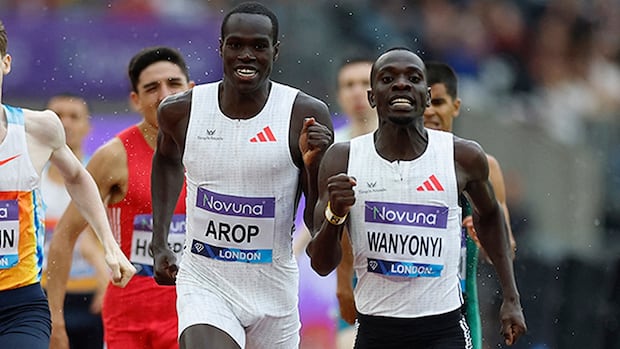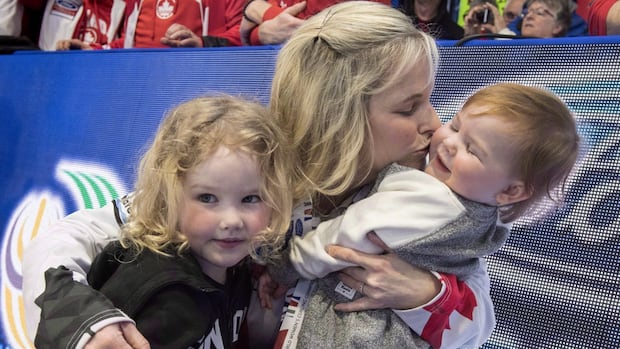Day 66:20As corporate sponsors walk away, some LGBTQ advocates say Pride should return to its activist roots
Despite major sponsors pulling their support from this year’s Toronto Pride festivities, one advocate says that it might actually be a chance to put a new focus on Pride’s raison d’etre.
“The focus of Pride as an overall event must be … the people,” Nicki Ward, an advocate who’s worked on 2SLGBTQ+ housing and disability issues in Canada for over 25 years, told CBC Radio’s Day 6.
“Maybe it’s time for a little more authenticity. And if company XYZ doesn’t want to get involved, well then, too bad.”
Earlier this month, Pride Toronto said it’s facing a $900,000 funding gap due to sponsors — including Google, Nissan, Home Depot and Clorox — pulling support, and the rising costs of running the festival.
Executive director Kojo Modeste linked the corporate withdrawals to backlash against diversity, equity and inclusion efforts in the United States under President Donald Trump’s administration.
Toronto isn’t the only city with Pride festivals facing similar challenges. Organizations across Canada are grappling with a chilled enthusiasm among sponsors and donors this year, even as a new poll suggests Canadian support for 2SLGBTQ+ rights hasn’t waned. Now, organizers are forced to search for the delicate balance between growing Pride’s audience and staying true to its activist roots fighting for 2SLGBTQ+ rights
Zac Rempel, managing director of the Vancouver Pride Society, says their sponsorships this year are down about 50 per cent compared to last year. Their programming has been cut from a 10-day festival last year to a three-day weekend because of the lack of funds.
“We are running on a skeleton crew right now,” said Rempel.
In a statement posted online, Halifax Pride says it chose to part ways with some longtime sponsors and parade participants, while others stepped back “for reasons we weren’t told, but we can read the room.”
In the U.S., major corporations like MasterCard, Pepsi and Deloitte pulled out of Pride events in New York, Washington, D.C., and San Francisco. According to research cited by Axios, a majority of the corporations surveyed about their reasons for pulling out cited the Trump administration, and conservative activists and policymakers.
Corporate pinkwashing
According to Ward, the transformation of many Pride festivals from a protest march to a major parade with corporate sponsors, including some flying their company logos at a parade, didn’t happen overnight.
Some of the earliest companies to sponsor Pride events were local breweries or other alcohol businesses, simply because the marches and parades were also big parties.
“Later on, some of the banks got involved, which I actually think they came with good hearts, to try to make sure that their employees felt that they could bring their whole selves to work,” she said.

Later, however, corporate motives became more capitalistic as Pride’s audience and the amount of money involved increased.
“People would pay, basically, to pinkwash their companies and be gay for a day. [As if to say], ‘Yeah, sure, we tolerate them,'” she said. Pinkwashing is a term used to describe corporations appealing to 2SLGBTQ+ communities, despite engaging in activities or practices that might harm those communities.
That’s led to tensions between multiple camps who disagree about what Pride should look like. In Montreal, for example, several 2SLGBTQ+ groups cut ties with Fierté Montréal, accusing it of prioritizing image over activism.

Tom Hooper, an assistant professor in the department of human rights and equity studies at York University, said he thinks major corporations sponsoring or marching in Pride events gave many people in the 2SLGBTQ+ community a sense of acceptance and even safety, especially for people who worked at those corporations.
But when they pull out en masse, it puts doubt on why they joined in the first place.
“Did they just see us as this market to feed their bottom line? Was this just an opportunity to advertise?” he said.
‘Pride is not just a party’
Fiona Kerr, executive director of Halifax Pride, thinks so — especially when it comes to the bigger, multinational corporations who aren’t as vulnerable to financial constraints as smaller sponsors with ties to their local communities.
“I think a lot of larger sponsors are reckoning with the fact that Pride is not just a party and are choosing to walk away because of it. It’s not the happy, fun dance party they originally signed up for,” Kerr said in an email.
“A lot of Pride organizations are taking stronger political stances and active steps to protect our community, and those are things these companies don’t want to truly align themselves with.”
Pride Toronto says the festival faces a major financial shortfall after multiple corporate sponsors pulled their support, which the festival’s executive director links to American companies moving away from DEI efforts under the Trump administration.
Hooper said that while the Trump factor looms large on the situation, it shouldn’t be seen as the only factor. “We have our own Canadian versions of attacks on diversity, equity and inclusion,” he said, noting that some political candidates in the spring’s election took aim at so-called “woke” policies.
“Canada’s not immune from a lot of these policies that are aimed at gender-affirming care, that are aimed at school curriculum. We’re having these same debates,” he said.
Meanwhile, an Ipsos poll released Friday suggests that a majority of Canadians support 2SLGBT+ visibility, rights and protections, at rates “far higher” than the average of 26 countries covered in the poll.
Seventy-eight per cent of Canadians surveyed said that same-sex couples should be allowed to marry legally, and 79 per cent supported protections for 2SLGBT+ against discrimination in employment, housing and access to businesses.
The poll, conducted online with about 1,000 participants in each country from April 25 to May 9, did find support for specific transgender protections, such as for health insurance coverage of gender transition, was divided. It also found that women were largely more supportive of 2SLGBT+ rights than men, and that difference was greatest among respondents under 35 years old.
A parade? A march? Both?
Ward and others told CBC that while the latest challenges have forced a rethink about what partnerships Pride festivals take on in the future, they’re not ruling them out entirely.
Kerr says Halifax Pride held community consultations on how to fill funding gaps that, while they “wouldn’t totally fill the gap” left by sponsors who have withdrawn their support or might do so in the future, will help them be less dependent on corporate sponsors.
“Money and spirituality can mix, but boy, it’s awfully tricky,” said Ward. She believes “a less commercial, more people-based Pride” could work, and even attract audiences who yearn for “a more authentic, less gaudy but more fabulous” festival compared to recent years.

She said Toronto’s Trans March has managed to keep its “spiritual centre” because it’s still a walking march and not a parade with floats or other accoutrements.
But that doesn’t mean wiping away the parades, parties and fun of Pride entirely — in fact, it’s a deeply important part of its DNA.
“They want that celebration. They want that joy, which is completely valid,” said Rempel.
“Joy is radical in and of itself.”








